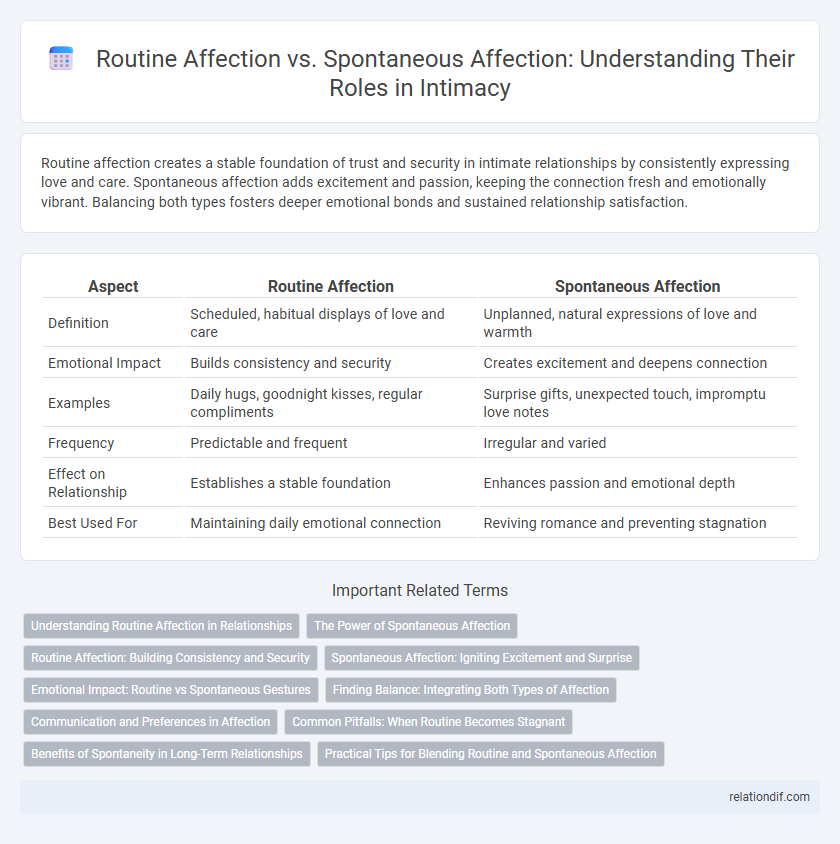Routine affection creates a stable foundation of trust and security in intimate relationships by consistently expressing love and care. Spontaneous affection adds excitement and passion, keeping the connection fresh and emotionally vibrant. Balancing both types fosters deeper emotional bonds and sustained relationship satisfaction.
Table of Comparison
| Aspect | Routine Affection | Spontaneous Affection |
|---|---|---|
| Definition | Scheduled, habitual displays of love and care | Unplanned, natural expressions of love and warmth |
| Emotional Impact | Builds consistency and security | Creates excitement and deepens connection |
| Examples | Daily hugs, goodnight kisses, regular compliments | Surprise gifts, unexpected touch, impromptu love notes |
| Frequency | Predictable and frequent | Irregular and varied |
| Effect on Relationship | Establishes a stable foundation | Enhances passion and emotional depth |
| Best Used For | Maintaining daily emotional connection | Reviving romance and preventing stagnation |
Understanding Routine Affection in Relationships
Routine affection in relationships reinforces emotional security by establishing consistent expressions of love and care, such as daily hugs or goodnight kisses. This predictable pattern fosters trust and stability, meeting partners' emotional needs through reliable gestures. Understanding the balance between routine affection and spontaneous acts helps maintain intimacy and prevents feelings of neglect.
The Power of Spontaneous Affection
Spontaneous affection ignites deeper emotional connections by breaking the predictability of routine gestures, creating moments charged with genuine surprise and vulnerability. Unlike routine affection, which can become habitual and lose impact, spontaneous acts foster freshness and excitement in relationships, reinforcing bonds through unexpected expressions of love. Research shows that these unplanned moments trigger positive dopamine responses, enhancing intimacy and overall relationship satisfaction.
Routine Affection: Building Consistency and Security
Routine affection fosters a stable foundation in relationships by creating consistent opportunities for emotional connection and reassurance. Regular expressions of love and care, such as daily hugs or verbal affirmations, enhance feelings of security and trust between partners. This steady pattern of affection helps build resilience in the relationship, promoting long-term intimacy and mutual understanding.
Spontaneous Affection: Igniting Excitement and Surprise
Spontaneous affection ignites excitement and surprise, breaking the monotony of daily routines and deepening emotional bonds. Unexpected gestures like a sudden kiss or an impromptu compliment stimulate dopamine release, enhancing feelings of happiness and connection. This unpredictable warmth fosters intimacy by creating memorable moments that reinforce partnership and love.
Emotional Impact: Routine vs Spontaneous Gestures
Routine affection creates a foundation of consistent emotional security, fostering trust and stability in relationships. Spontaneous gestures, however, trigger heightened emotional responses by introducing surprise and novelty, which can deepen intimacy. Balancing both ensures emotional connection remains both reliable and vibrant.
Finding Balance: Integrating Both Types of Affection
Routine affection provides stability and reassures partners through consistent gestures like daily hugs or goodnight kisses, fostering emotional security. Spontaneous affection introduces excitement and novelty, strengthening the bond by breaking monotony with unexpected compliments or surprises. Finding balance involves blending predictable routines with impromptu expressions, ensuring a dynamic and resilient intimate connection that nurtures both comfort and passion.
Communication and Preferences in Affection
Routine affection establishes a predictable rhythm reinforcing security, while spontaneous affection injects surprise and excitement, both essential for balanced intimacy. Effective communication allows partners to express their preferences, ensuring affectionate behaviors align with individual needs and emotional responses. Understanding these preferences enhances connection by respecting boundaries and fostering emotional safety within the relationship.
Common Pitfalls: When Routine Becomes Stagnant
Routine affection can become predictable and lose its emotional impact, leading to feelings of stagnation and disconnection in intimate relationships. Common pitfalls include performing gestures out of obligation rather than genuine desire, which can erode emotional warmth. Incorporating spontaneous affection revitalizes intimacy by fostering surprise, emotional engagement, and renewed connection.
Benefits of Spontaneity in Long-Term Relationships
Spontaneous affection in long-term relationships fosters emotional excitement, renewal, and deeper connection by breaking predictable patterns and reigniting passion. It enhances emotional intimacy and trust through unexpected gestures that show genuine care and attention. This unpredictability also reduces relationship stagnation, promoting continuous growth and resilience against daily stressors.
Practical Tips for Blending Routine and Spontaneous Affection
Balancing routine affection with spontaneous gestures enhances intimacy by fostering both security and excitement in relationships. Schedule regular moments of connection, such as daily hugs or morning kisses, while surprising your partner occasionally with unexpected compliments or small acts of kindness. Incorporate variety by combining consistent affectionate habits with spontaneous expressions to sustain emotional closeness and deepen your bond.
routine affection vs spontaneous affection Infographic

 relationdif.com
relationdif.com